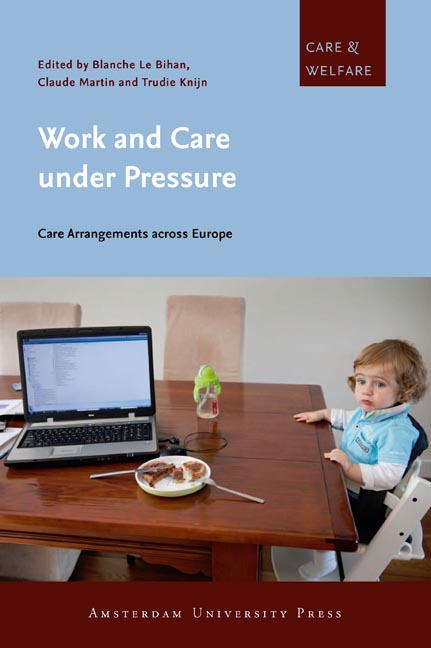Book contents
- Frontmatter
- Contents
- 1 Introduction: Workers under pressure and Social care Arrangements: A Research Framework
- 2 Work-family Balance in the Netherlands: Work and Care Culture Mediating Between Institutions and Practices
- 3 Negotiating Gender Equality, Atypical Work Hours and Caring Responsibilities: The case of Sweden
- 4 Caregiving and Paid work in Germany: The Impact of Social Inequality
- 5 Working Caregivers ‘Living Under Pressure’ in France
- 6 Negotiating Work and care in a Changing Welfare Regime: The case of Portugal
- 7 Blurring Boundaries and Clashing Loyalties: Working and caring in Italy
- 8 The changing mix of care in six European Countries
- About the Contributors
- Care & Welfare
5 - Working Caregivers ‘Living Under Pressure’ in France
Published online by Cambridge University Press: 06 January 2021
- Frontmatter
- Contents
- 1 Introduction: Workers under pressure and Social care Arrangements: A Research Framework
- 2 Work-family Balance in the Netherlands: Work and Care Culture Mediating Between Institutions and Practices
- 3 Negotiating Gender Equality, Atypical Work Hours and Caring Responsibilities: The case of Sweden
- 4 Caregiving and Paid work in Germany: The Impact of Social Inequality
- 5 Working Caregivers ‘Living Under Pressure’ in France
- 6 Negotiating Work and care in a Changing Welfare Regime: The case of Portugal
- 7 Blurring Boundaries and Clashing Loyalties: Working and caring in Italy
- 8 The changing mix of care in six European Countries
- About the Contributors
- Care & Welfare
Summary
Introduction
The debate in France on the balance between family and professional life is developing in a relatively paradoxical context. With one of the highest fertility rates in Europe (two children per woman in 2010, 2011 and 2012) and with nearly 60 per cent of women between the ages of 15 and 64 working (for the most part full-time), childcare services and nursery schools offer a wide range of care solutions. Nonetheless, stress levels among parents remain high, especially in comparison with other European countries, as shown by Crompton in 2006. In the light of these results, what Crompton calls work-life conflicts identified in households or stress related to the work-life balance are as significant in France as they are in the UK; although at a lower level than in the United States or even Portugal, it is still noticeably higher than in Norway or Finland (Crompton 2006: 132).
Analysts have pointed out different factors that might explain the difficulty French couples experience in reconciling family and working life. Crompton insists on the very unequal division of domestic and care tasks between genders, which she defines as ‘gender traditionalism’ (Crompton 2006: 32). Périvier argues a similar point when she describes the ‘status quo of inequality’ in France (Périvier 2007; Regnier- Loilier 2009; Maruani 2011), which has been confirmed by the recent national survey of family and intergenerational relations (ERFI Survey by INED). Another factor can be put forward as an explanation of the tensions between care and work in French households: the situation in the labour market and its deterioration in recent decades. As Concialdi has pointed out, temporary and part-time employment has been increasing significantly – in total, the number of precarious jobs increased by 2.5 million between 1983 and 2005, with this increase accounting for more than 60 per cent of the total growth of paid employment (Concialdi 2006: 20). According to the National Institute of Statistics and Economic Studies (L’Institut national de la statistique et des études économiques or INSEE), the status of 13 per cent of paid workers is precarious, including those in fixed-term contracts from the public and private sectors, temporary jobs and publicly subsidised employment (contrats aidés) (2007).
- Type
- Chapter
- Information
- Work and Care under PressureCare Arrangements across Europe, pp. 101 - 124Publisher: Amsterdam University PressPrint publication year: 2013



